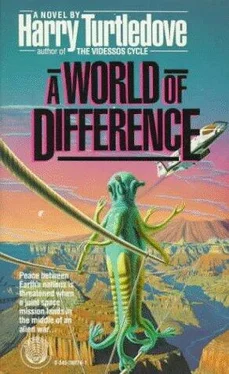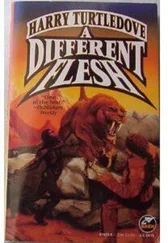“Domain master, you made a mistake,” he said, giving Dordal the courtesy of a title he knew his captive might not enjoy much longer.
“What are you doing here, Ternat?” Dordal’s voice was still proud but confused-he hadn’t changed much since the embassy, Ternat thought.
“I would think that was obvious, domain master-we are taking back what is ours. If you hadn’t crossed the border, we wouldn’t have come. Since you did-“ Reatur’s eldest let Dordal draw his own conclusions.
Those, as was characteristic of the northern domain master, were bizarre. “I think you were lying about the Skarmer this whole time, to lure me into raiding you without enough males.” Dordal sounded thoroughly indignant.
Ternat thought Dordal was a fool, but then he had thought that for a long while. “I’m afraid your greed made you stretch your eyestalks further than your arms would reach,” he said.
Dordal started to turn yellow. Ternat’s eyestalks twitched. Dordal quickly greened up again. Even he was not so stupid as to show his captor he was angry. “What will you do with me?” he asked.
“Take the lot of you back to our domain, I suppose,” Ternat said. He hadn’t thought much about that; he hadn’t expected to win such a complete victory. “Reatur will decide in the end. If I had to guess, I’ll say he’s likely to let you go back home after your eldest pays enough ransom to remind you not to trifle with us again.”
He waited for Dordal’s reaction. It did not disappoint him. This time Dordal turned yellow in earnest. “My eldest!” he shouted. “Grevil won’t pay a strip of dried meat for me! Let that grabby budling loose among my treasures and mates and he’ll want to keep everything for himself.”
Maybe Dordal did have some sense: that confirmed Ternat’s impression of the northern domain master’s eldest. It also confirmed that Grevil was his father’s budling. Dordal, Ternat was certain, would have done exactly the same thing in Grevil’s place.
“Well, we’ll just let Reatur sort that out,” Ternat said. “Perhaps if Grevil doesn’t grant you the respect and obedience a clanfather deserves, Reatur will send some males north to help you reclaim your domain-after the Skarmer are settled, of course.”
“I don’t care a three-day-old massi voiding about the Skarmer,” Dordal howled. “And if I get my domain back with help from Reatur’s males, there will be cords running from his arms to mine forever after.”
“Yes, there will, won’t there?” Ternat agreed cheerfully. “Maybe you should have thought about that before you decided to go massi-raiding. As it is, you’ll have some lovely three-day-old voidings to look at as we travel back to my clanfather’s domain.”
Dordal twisted all his eyestalks away from Ternat. Reatur’s eldest did not care how petulant Dordal felt. While the northern domain master was not looking, he walked away. Dordal started to talk again. He abruptly fell Silent when he turned one eyestalk back and noticed that no one was listening to him.
Ternat didn’t care about that, either. He was shouting to his own warriors now, getting them back into some kind of order so they could lead their prisoners and the re.c. aptured beasts home without half escaping in the process. Ternat did not have three eighteens of plans for overthrowing his clanfather. His time would come one day. Until then, he was content to wait.
And that, he supposed, only went to show that he was Reatur’s budling. “Good enough,” he said out loud.
Sergei Tolmasov watched Rustaveli lean back in his chair. As usual, the Georgian was wearing a mischievous expression. He said, “I doubt much work is getting done aboard Tsiolkovsky at the moment-not much that involves the brain, anyway, unless Yuri is reading Katya some of his poetry.” He had just brought the rover back to Hogram’s town after Katerina drove it down to the ship.
“Not much work getting done here, either,” Tolmasov said, not rising to the bait.
“You, my friend, are entirely too serious, as I’ve said at least a hundred times.”
“At least,” Tolmasov agreed. Rustaveli snorted.
“That does not mean he is wrong, Shota Mikheilovich,”
Valery Bryusov put in. He often had trouble recognizing a joke.
“No, it doesn’t,” the pilot said, “because there isn’t much getting done here.” He had never imagined he could become irrelevant during the Minerva mission, but he had. He didn’t like it one bit.
Damn Oleg Lopatin! Athena was screaming at Washington and, almost incidentally now, at Tolmasov; Washington was screaming at Moscow; and Moscow, not incidentally at all, was screaming at Tolmasov. He could not even blame any of them- had he been any place in the loop but where he was, he would have been screaming, too. But he had no one to scream at, not when Lopatin wouldn’t use his cursed radio.
He couldn’t even ask Hogram to send on a written message. For one thing, the local domain master was barely in communication with his army on the far side of Jotun Canyon. Crossing that stream was almost as hard for the Minervans as getting to Minerva had been for the Soviet Union and United States.
For another, problems between people meant nothing to Hogram. Because Hogram had talked with the Omalo domain master on the radio, he had to acknowledge there were more humans than the ones he had met. But he simply did not believe in a whole planet full of them, all at each other’s throats because one man had gone berserk. Given what Hogram knew, Tolmasov wouldn’t have believed it, either. Unfortunately, it was true.
And so the crew of Tsiolkovsky went through the motions of doing more research: Bryusov comparing country and town dialects, Rustaveli working on his rocks, Katerina and Voroshilov joining together on a biochemical study. None of it seemed to mean much now.
“Yuri isn’t sorry Lopatin’s gone and got himself in this mess,” Rustaveli observed.
“Then why did he cut you off when you called the Americans?” Tolmasov answered his own question. “Because his head might roll, too, I suppose, if anyone back home”-as polite a euphemism as he had ever come up with for the KGB-“thought he’d overhead you and done nothing. But I daresay you’re right, because of Katya if for no other reason.”
“There are others,” Rustaveli said slowly. The pilot glanced over at him, he rarely sounded so serious. Seeing he had Tolmasov’s attention, the geologist went on, “Yuri complained that Lopatin snooped through the poems he wrote for her and stored them in his secret computer file. Evidence, I imagine, but only a chekist could say of what.”
“I’d hate a man for that, too,” Tolmasov said.
“And I,” Bryusov agreed, though Tolmasov had trouble imagining Bryusov worked up enough about anything to hate the man who did it. Maybe if an academician from Arkhmolinsk stole something from one of his papers and published it first: anyone would be furious over that kind of pilfering.
Then the full meaning of Rustaveli’s words got through to the pilot. “Wait a minute,” he said. “How does Yuri know they’re in Lopatin’s secure file?”
“How else?” Rustaveli put a flippant shrug in his voice. “He read them.”
“That’s impossible.” Tolmasov had tried to access Lopatin’s secure file, tried and failed. If the pilot of a mission was not trusted with the passwords he needed to get into a KGB man’s files, what were the odds a chemist would be? There was no way…, no, there was one.
Rustaveli was waiting when Tolmasov looked up. The Geol’gian nodded. “That’s right,” he said. “But you will notice I have not told you any such thing.”
“Like that, eh? No, of course, you haven’t, Shota Mikheilovich. But Yuri! Who ever would have thought that about Yuri?”
Читать дальше












